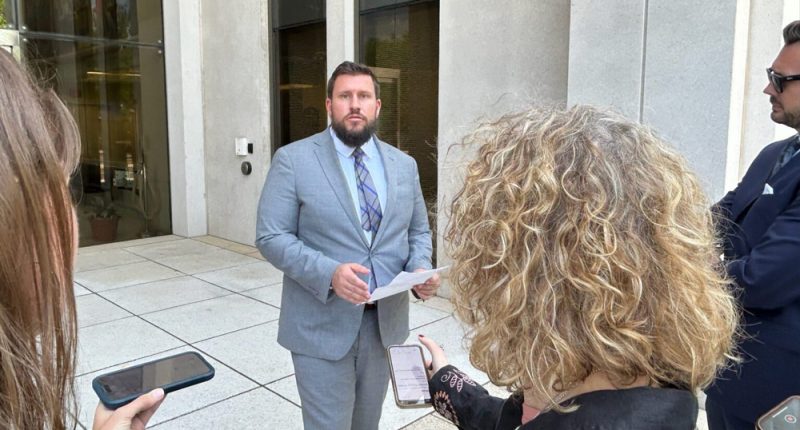
A federal court hearing held Thursday to determine the fate of Florida’s strict new law on ballot initiatives veered into culinary criticism as an attorney compared the measure to “sausage.”
Attorneys for the DeSantis administration insisted that sausage is edible while those on the other side called it “rancid.”
Florida legislators passed the law after citizens’ initiatives to allow abortion and recreational pot nearly passed last November. Critics contend that the new law — with all of its restrictions on groups and who can collect signatures — will make it nearly impossible for outside organizations to ever place an initiative on the ballot in the future.
Groups have challenged the new law — which was a top priority for Gov. Ron DeSantis — on grounds that it violates their rights to free speech and due process.
During the hearing, Chief U.S. District Judge Mark Walker listened to about three hours of testimony on Florida Decides Healthcare’s and Smart & Safe Florida’s request that he block certain provisions of the law while the legal challenge moves ahead — including a requirement that sponsors turn in completed petitions within 10 days after the voter signs the petition, as well as stepped up fines and criminal penalties.
Walker, who posed pointed questions to both sides, asked everyone to “please be patient,” as he considers his ruling.
Florida Decides is behind a campaign to put a Medicaid expansion on the ballot in November 2026. Smart & Safe Florida is behind a renewed initiative to make recreational marijuana legal for adults in Florida.
Both groups need to collect and certify 880,000 voter signatures before Feb. 1 of next year to make the November 2026 ballot.
Tallahassee attorney Glenn Burhans Jr. said that, prior to the new law taking effect, Smart & Safe Florida was collecting 78,000 signatures per week. Since the law took effect, he said, the group is collecting between 12,000 and 15,000 signatures per week.
He said that 1,100 petition circulators who were out in the field have been “lost” due to the law with its felony penalties.
“That places the ability to get this on the ballot in peril,” he said.
Burhans noted that the law not only condenses the time to submit a petition, it doesn’t allow for the period to be extended to account for office closures or holidays — the Legislature, he noted, rejected such extensions. That means petition collectors could have as little as seven days to turn in the forms, he said.
 Burhans used the coming Memorial Day Weekend as an example, noting that supervisors of elections offices will be closed from May 24-27. If Smart& Safe Florida collected 1,700 signatures on May 16 but didn’t deliver them before an office closed, it could face fines of upward of $255,000 ($85,000 a day times three days).
Burhans used the coming Memorial Day Weekend as an example, noting that supervisors of elections offices will be closed from May 24-27. If Smart& Safe Florida collected 1,700 signatures on May 16 but didn’t deliver them before an office closed, it could face fines of upward of $255,000 ($85,000 a day times three days).
“Your honor, that’s real life. That’s impact,” he said.
Tallahassee attorney Mohammad Jazil, representing Secretary of State Cord Byrd, said that the timeline was condensed from 30 days to 10 days to give the supervisors of elections more time to review the petitions and sniff out fraudulent forms.
The state intends to keep language in its rules and regulations that would allow sponsors to deliver petitions outside the 10-day time frame for holidays and office closures, Jazil said.
Is the sausage edible or rancid?
Walker pressed Jazil on some points, such as what constitutes personal identifying information that must be placed on the petitions. Jazil defended HB 1205 and at one point noted that legislation being made was like watching sausage get made — a famously distasteful process. Jazil joked that this sausage, HB 1205, was edible.
“Sometimes the sausage aren’t real tasty, that’s why we have challenges here,” Walker replied.
In his rebuttal, Burhans said the law bans supervisors from reviewing ballots between July 1 and September 1. That, he said, doesn’t give supervisors more time, but instead creates a 90-day log jam.
Additionally, Burhans stressed that HB 1205 specifically removed language from statute allowing for extensions for holidays and office closures. Agencies cannot promulgate rules contrary to law, he said.
“The sausage is not only bad, it’s rancid and filled with maggots,” Burhans said.
Mitch Emerson, executive director of Florida Decides Healthcare, told reporters following the hearing that he was optimistic.
“We had the opportunity to make it very clear why this law is unconstitutional and un-American. This isn’t just about one campaign. It’s about protecting every Floridian’s right,” he said. Blocking the law, he continued, would return the state to the existing rules that petition gathers have relied on for years.
“This means giving people back the ability to organize, gather signatures, and bring issues directly to the ballot without fear, confusion.”
–Christine Sexton, Florida Phoenix










